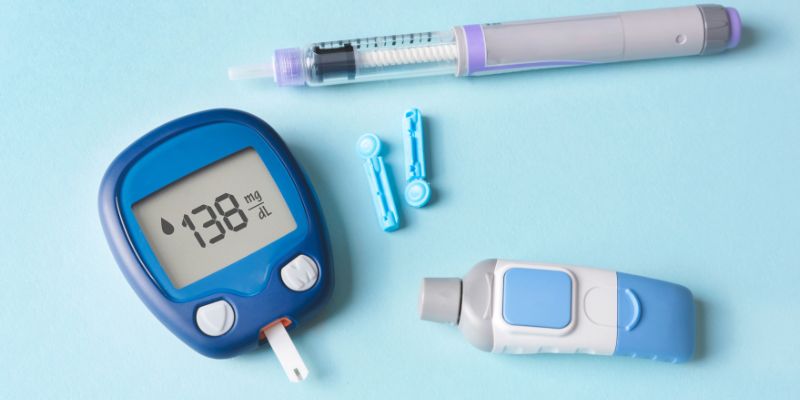What Are The Best Ways To Help Someone Living With Type 2 Diabetes: A Guide
Having Type 2 diabetes can make life difficult. Managing food, blood sugar, and lifestyle modifications might feel taxing. Supporting someone you love who has Type 2 diabetes will significantly improve their health and well-being.
Your help can light their path whether it's with food planning, keeping active together, or simply attentive listening. Seven doable strategies for helping someone control their illness and lead better lives are discussed in this guide. Remember: little actions can have a significant influence.

Encourage Healthy Eating Habits:
Control of Type 2 diabetes depends on a healthy diet. Urge the person to adopt a diet heavy in lean proteins, whole grains, vegetables, and good fats. Help them design a meal schedule with an eye on nutrient-dense foods that limit processed carbohydrates and sugar. Cooking meals together could be a fun and interesting pastime. Additionally important is portion control; teach them to balance their plate with appropriate ratios of every food category.
Keep educated about foods, including leafy greens, almonds, and fish, that can help control blood sugar. Although one should avoid bad foods, it is equally crucial not to make the person feel limited. Help them discover mouthwatering, diabetes-friendly meals they will appreciate, enabling sustainable and fun eating.
Promote Regular Physical Activity:
Exercise is vital in managing type 2 diabetes by helping control blood sugar levels. Motivational tools for your loved one to be active include: That does not mean kids must participate in demanding sports. Moderate exercise, including swimming, cycling, or walking, can improve their condition.
Look for pursuits you two could enjoy. Try home workouts, join a yoga class, or stroll in the park. Helping them be active will improve their general condition and help control their diabetes. Make it enjoyable, and steer clear of turning it into a chore.
Frequent physical exercise also helps preserve a good weight, which is crucial in controlling diabetes. Recall that little deeds can have a big influence. By actively supporting their fitness path, you may celebrate their advancement and keep them inspired.

Help Them Monitor Their Blood Sugar:
Managing Type 2 diabetes depends on constantly monitoring blood sugar levels. Offer to assist in tracking their glucose readings. Remind them to check their levels and document the findings routinely. A little help can go a long way in cases where some people find the procedure overwhelming or are worried about pricking their fingers. Urge them to test according to advice from their healthcare practitioner on when and how often.
Researching the best monitoring tools or applications can also simplify the procedure. Consistent monitoring is crucial for understanding how food, stress, and exercise impact blood sugar levels. Participating in this part of their treatment shows that you appreciate the need for everyday diabetes management and are there to support them on their road to improved health.
Offer Emotional Support:
Having Type 2 diabetes can wear one emotionally. Offer a listening ear when they need to blow out or discuss their emotions. Recognize their difficulties and inspire them to, should they need professional assistance, counseling, or support group membership.
Tell them it's normal to feel overwhelmed or frustrated occasionally, but also remind them of their strength and capacity for condition management. Showing compassion and patience can help lessen the emotional weight diabetes can impose. Being emotionally present will increase their drive and support their ability to remain dedicated to controlling their health.
Learn About Their Condition:
Knowing Type 2 diabetes will help you to offer greater support. Learn about the condition's causes, symptoms, and available treatments. Discover how diabetes alters the body, what causes blood sugar to increase, and the possible consequences should poor management be neglected. You might visit seminars, study books, or even speak with medical experts to get more understanding.
Knowing will help you to have more meaningful talks with your loved one and provide wise advice when needed. Seeing that you have taken the time to grasp their situation helps them realize they are not alone. Furthermore, the more you know, the better you can help them to keep on target with their treatment plan and make wise judgments.
Help Them Manage Medications:
Control of Type 2 diabetes depends critically on proper medication management. Offer to help your loved one arrange their oral or insulin meds. You might help them to arrange a pill organizer or remind them to take their prescriptions on schedule. Know the adverse effects of their drugs so you may spot any symptoms and help them to follow up with their doctor as needed.
You can also help them set reminders on their phones or with applications to help with medication management. By assisting with this schedule, you lower the chance of missing medications or using the wrong dosagetwo things that might cause problems. It also reveals your concern for their health and willingness to support them in handling daily diabetic issues.
Create a supportive environment.
Encouragement of a supportive environment is one of the most important ways you may assist someone with Type 2 diabetes. Whether at home, at business, or at social events, set up an environment where simple, easy-to-maintain healthful options abound. Keep diabetes-friendly foods in the cupboard; recommend restaurants with better dining options. Motivational tools help individuals to follow their treatment schedule without undue intervention.
Rather, be upbeat and gently remind them or engage in healthful activities alongside them. Help them avoid temptations and maintain low-stress levels since it might cause bad eating and blood sugar swings. Positive surroundings help individuals to keep to their lifestyle modifications and make better judgments.
Conclusion:
Helping someone control Type 2 diabetes requires providing emotional and useful help. You can significantly improve their lives by motivating good practices, staying active, and knowing the situation. Little deeds that demonstrate your care and dedication to their health journey include aiding with blood sugar monitoring or building supportive surroundings. Remember, your support must be constant and deliberate, perfect is unnecessary.












